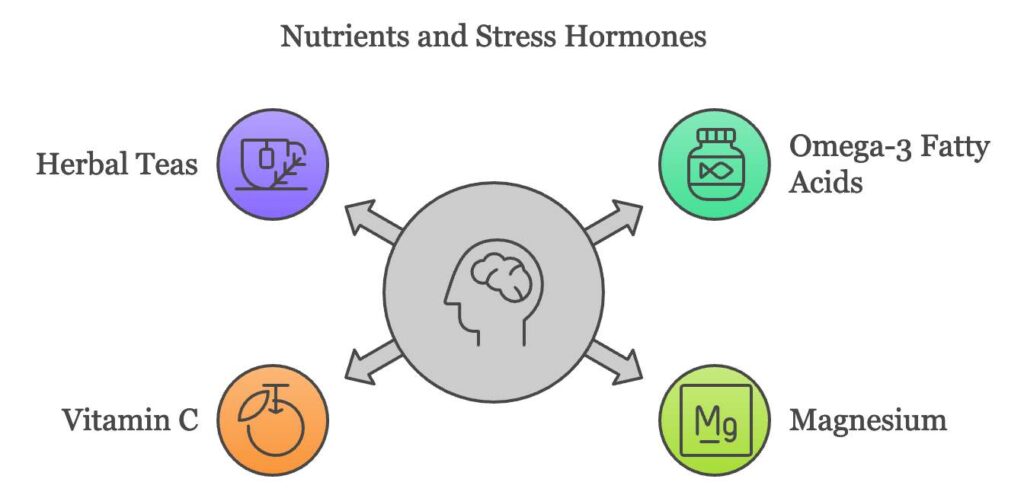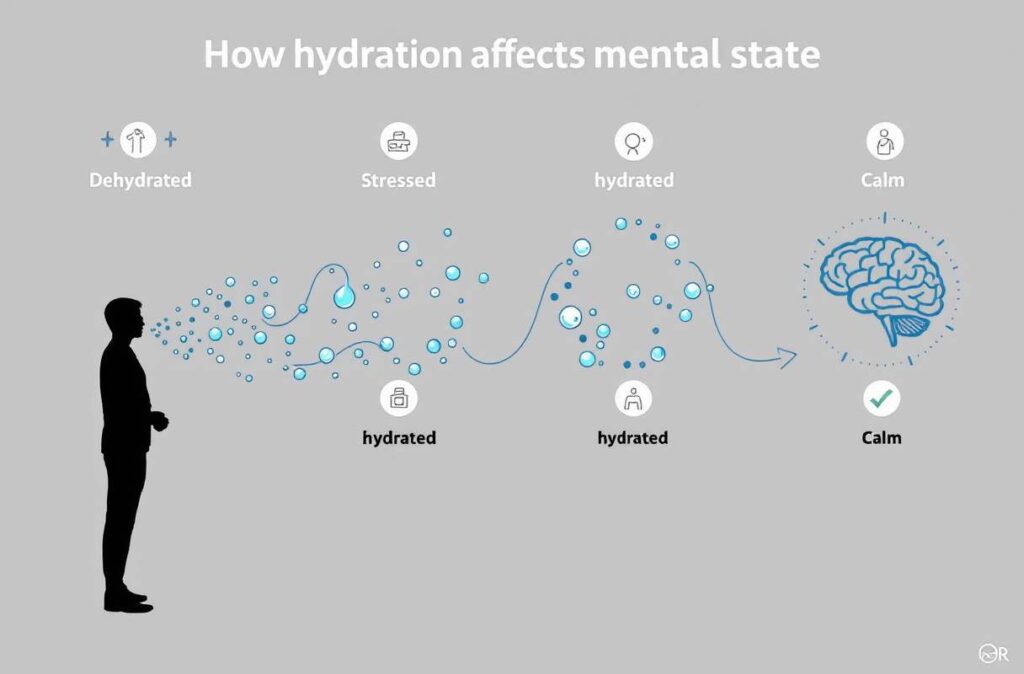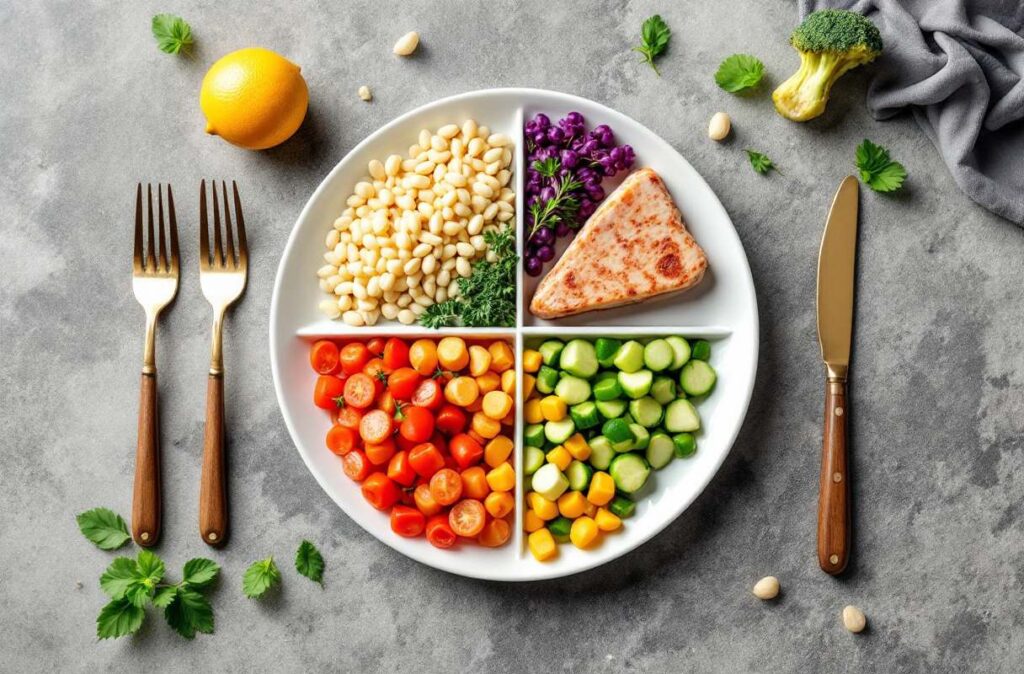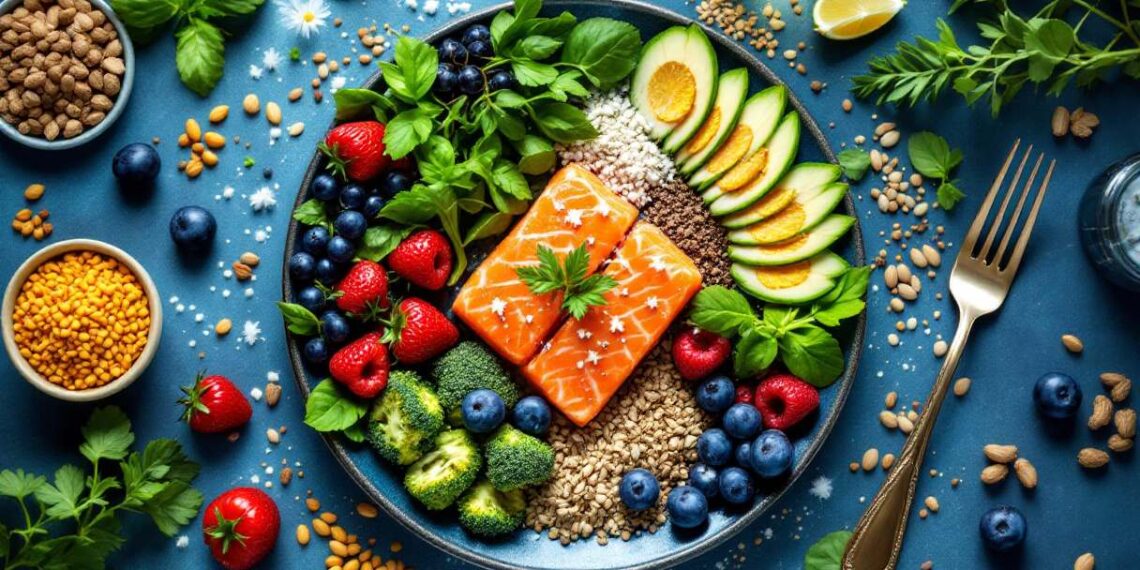Ever noticed how a sugary snack can leave you feeling more frazzled than before, while a balanced meal seems to steady your nerves? The connection between what’s on your plate and what’s on your mind isn’t just in your head – it’s science. In our fast-paced world where stress seems to be served with every meal, understanding how nutrition impacts your mental state could be the game-changer you’ve been craving.
Whether you’re battling deadline pressures, juggling family responsibilities, or just trying to keep your cool in a chaotic world, your diet might be the secret weapon you never knew you had. Let’s explore how the right foods can transform your stress response from frantic to focused.
Understanding Stress and Nutrition
Eating right is way more important than we usually give it credit for, especially when juggling stress and mental health. What we eat can deeply affect how we handle stress.
The Link Between Diet and Stress
We often skip over how food affects how freaked out or chill we feel. But shoutout to those who know: eating the right stuff can seriously impact stress levels. Some foods help keep mood swings in check by playing nice with hormones like cortisol—our body’s stress messenger. Ignoring stress for too long could leave you feeling awful, as you can see in our piece on physical symptoms of stress.
“Let food be thy medicine and medicine be thy food.” – Hippocrates
Research tells us that munching on healthy stuff makes us tougher against stress. Eating whole foods like fruits, veggies, lean meats, and good fats is where it’s at for keeping spirits high. On the flip side, gobbling down processed goodies and sugary snacks might make anxiety and the blues pop up.
| Diet Type | Impact on Stress Levels |
|---|---|
| Whole Foods | Less stress, better mood |
| Processed Foods | More anxiety and the blues |

Importance of Nutrient-Rich Foods
Foods packed with nutrients are like your brain’s best friend, loaded with vitamins and minerals that keep stress at bay. Omega-3s, B vitamins, and magnesium are superheroes for your mind. Omega-3s, mostly in fish, have been known to ease anxiety and help with the sadness clouds. B vitamins shine in supporting the noggin and boosting energy. As for magnesium, it’s like a stress-bouncer, keeping cortisol in check.
Getting these power-packed foods into your diet is your ticket to a calmer, happier you. Tossing a mix of these goodies on your plate can crank up your mood and overall mental game. If you’re looking to map out a stress-busting plan, check out our advice on a stress management plan.
| Nutrient | Food Sources | Benefits |
|---|---|---|
| Omega-3 Fatty Acids | Salmon, walnuts | Lowers anxiety |
| B Vitamins | Whole grains, eggs, cheese | Brain booster |
| Magnesium | Spinach, nuts, seeds | Calms stress |
By figuring out how nutrition ties into stress, folks can make smarter food choices. This move can lead to feeling better and dealing with life’s curveballs calmly, easing long-term stress as shared in our guide on chronic stress symptoms.
Top Foods to Chill Out
Gobbling up the right grub can really help take the edge off stress. Some foods are like little superheroes for your nerves, packing a nutrient punch that helps keep stress at bay. Let’s explore some tasty options:
Greens That Keep You Lean (and Chill)
Spinach, kale, and Swiss chard aren’t just rabbit food—they’re stress-fighting warriors with a cause! These leafy champs are jam-packed with vitamins and minerals, especially magnesium, the magic mineral that gives stress and anxiety the boot. This nutrient’s like your internal buffer, softening the blow of cortisol, the stress hormone.
| Nutrient | In 1 cup (when cooked) |
|---|---|
| Magnesium | 157 mg |
| Folate | 263 mcg |
| Vitamin K | 889 mcg |
Toss these greens into your meals to give your mind a peace boost. Blend them into a smoothie, mix into a salad, or toss them into a stir-fry—boom! Instant health hero.
Fishy But Fabulous
Ever met a sad salmon? Nope, didn’t think so. Fatty fish like salmon, mackerel, and sardines are packed with omega-3 fatty acids, the good stuff that tackles stress like a pro, reducing inflammation and keeping the noggin happy. Plus, they help balance out those mood-swinging neurotransmitters.
| Nutrient | In 3 oz (cooked) |
|---|---|
| Omega-3 Fatty Acids | 1,500 – 2,500 mg |
| Vitamin D | 570 IU |
| Protein | 22 g |
Grill it, bake it, or toss it in a salad. Your brain’s gonna love this fin-tastic addition to your diet.
Go Nuts for Nuts and Seeds
Feeling nutty? Great! Munching on almonds, walnuts, flaxseeds, or sunflower seeds can work wonders to keep stress levels low. Loaded with magnesium and healthy fats, these snacks support brain health and keep your mood in check.
| Food Item | Magnesium (mg) per 1 oz |
|---|---|
| Almonds | 76 mg |
| Walnuts | 45 mg |
| Flaxseeds | 40 mg |
| Sunflower Seeds | 37 mg |
Snack on them solo, mix ’em into salads, or blend ’em up in a smoothie for a stress-busting snack attack.
Adding these bites to your daily grind is a solid step towards finding your chill zone. If you’re on the lookout for faster stress-busting hacks, check out quick stress relief techniques or whip up a detailed stress management plan.

More Stress-Reducing Foods
Besides dark leafy greens, fatty fish, and nuts, there’s a whole gang of other foods ready to wage war on stress. Welcome berries, whole grains, and avocados into your meal plan for a solid boost to your mental health game.
Berries
Meet the berry squad: strawberries, blueberries, and raspberries. They’re like tiny stress-busting machines, loaded with antioxidants and vitamin C. These nutrients are on a mission to chill out your body’s stress and inflammation. Studies show antioxidants pack a punch against stress hormones, keeping your mind in check.
| Berry Type | Antioxidant Content (mg/100g) | Vitamin C (mg/100g) |
|---|---|---|
| Blueberries | 4,500 | 9.7 |
| Strawberries | 2,200 | 58.8 |
| Raspberries | 1,300 | 26.2 |
Add these bad boys to your meals or grab some as snacks. Your mood gets a lift, and stress goes down a notch. Toss them in smoothies, sprinkle over salads, or mix with yogurt—pick your vibe.
Whole Grains
Enter whole grains: quinoa, brown rice, and oats. They’re your friendly carbs, helping to pump up serotonin, the feel-good neurotransmitter. They keep your blood sugar steady, so you don’t crash and burn from stress.
| Grain Type | Fiber (g/100g) | Magnesium (mg/100g) |
|---|---|---|
| Quinoa | 2.8 | 64 |
| Brown Rice | 1.8 | 25 |
| Oats | 10.6 | 34 |
Bring some whole grains into your meals to balance out your diet and keep your spirits up. Morning oatmeal or a lunchtime brown rice bowl could be the mood saviors you need.
Avocados
Avocados, the smooth operator of fruits, deliver more than just creamy goodness. Packed with monounsaturated fats, B vitamins, and potassium, they’re all about keeping your blood pressure in check and the nervous system smooth, both essential for stress control.
| Nutrient | Amount per 100g |
|---|---|
| Healthy Fats (g) | 15 |
| Potassium (mg) | 485 |
| Folate (µg) | 81 |
Whip them into salads, smoothies, or spread them on toast for a rich way to say goodbye to stress. Their creamy flavor jazzes up dishes, turning healthy eating into a party for your taste buds.
Mixing these foods into your everyday meals can be part of your stress-busting toolkit. For more ways to tackle stress head-on, check out our stress management plan.
Incorporating Stress-Reducing Foods in Your Diet
Sprinkling some calming goodies into your daily meals can really boost how you feel. Check out these meal and snack ideas to effortlessly slide these stress-easing champs into your diet.
Meal Planning Tips
Plotting your meals with stress-busting foods can keep your head and heart in check. Here’s how you can do it smoothly:
- Weekly Game Plan: Craft a weekly menu featuring calming foods like dark leafy greens, fatty fish, and nuts. It makes grocery shopping a breeze and kicks last-minute junk food out the door.
- Cook Once, Eat Twice (or more!): Go big or go home! Make large batches of stress-busting meals like whole grain salads or fish stews. This way, you’ve got a healthy meal ready for those hectic days.
- Keep It Balanced: Build your plate with a mix of goodies. Think protein (like nuts or seeds), healthy fats (avocados are your friend), and hearty carbs (ya can’t go wrong with whole grains).
| Meal Type | Recommended Foods |
|---|---|
| Breakfast | Oatmeal with a bunch of berries and nuts |
| Lunch | Quinoa salad with leafy greens and avocado |
| Dinner | Baked salmon, broccoli on the side, and brown rice |
| Snacks | Yogurt with a sprinkle of fruits or nuts |
Snack Ideas
Need a little recharge? Snacks are here to keep you perky and chill. Try these stress-lovin’ ideas:
- Go Nuts Mix: Toss together almonds, walnuts, and pumpkin seeds. They’re loaded with good fats, protein, and magnesium—perfect for keeping stress levels in check.
- Berry Bliss Yogurt: Greek yogurt with a splash of mixed berries is rich in probiotics and antioxidants, which are buddies with your mental health.
- Avocado Toast Magic: Whole-grain toast topped with creamy avocado and a dash of salt and pepper is simple, but it packs a punch.
- Tiny Piece of Joy—Dark Chocolate: Munch on a small square of dark chocolate. It’s got flavonoids that might just lift your spirits.
- Crunchy Hummus Mix: Pair hummus with some carrots, cucumber, or bell pepper slices for a protein-and-fiber-rich snack that just feels good.
Choosing your meals and snacks with care not only fills your stomach but also puts your mind at ease. For more tips, peek at our stress management plan.
Hydration and Stress Management
Importance of Hydration
Staying hydrated ain’t just for desert survival or post-gym selfies, it’s crucial for keeping your mind and body in check. Not getting enough water can feel like trying to run your life on zero bars—sluggish, cranky, and unable to focus. Guzzling enough H2O greases the gears, making everything run smoother and helping to keep stress from piling up.

Here’s how hydration makes you more chill:
| Effect of Hydration | Impact on Stress |
|---|---|
| Keeps energy up | Wards off tiredness |
| Sharpens the mind | Boosts attention |
| Stabilizes mood | Brings a calm mindset |
| Keeps the body ticking | Softens stress blow |
Drinking your way to a calm state with water can stoke your stress-fighting powers. A general guide is to aim for eight 8-ounce glasses a day, though, listen to your own cravings!
Stress-Reducing Beverages
Besides regular ol’ water, some drinks do double duty—quenching thirst and quelling worries. Here’s some stuff to pour:
| Beverage Checklist | Chill Out Factor |
|---|---|
| Herbal Tea (think chamomile, peppermint) | Calms nerves & chills you out |
| Green Tea | L-theanine inside helps with anxiety |
| Coconut Water | Packed with electrolytes, keeping you and your mood in harmony |
| Fresh Fruit Juices (like orange) | Vitamin C boost helps keep that nasty cortisol in check |
| Warm Milk | Loaded with tryptophan, helping you snooze and relax |
Sip these while you’re tackling life’s hurdles, knowing it helps tame the stress-beast. Looking for more relief tricks? Check out stuff like quick stress relief techniques or how to set boundaries stress, and find your calm amidst the chaos.
Mindful Eating Practices
Mindful eating invites folks to really be there and enjoy their meals. It’s not just about munching down; it’s about chilling out with your food and making each bite an experience. This groove can chill you out, and connect you with what’s on your plate in a richer way.
“The food you eat can be either the safest and most powerful form of medicine or the slowest form of poison.” – Ann Wigmore
Mindful Eating and Stress
There’s a cool link between eating with intention and feeling relaxed. When you slow down and focus on your meal, stress and anxiety levels tend to drop, and you’re more likely to get a kick out of your food. This way, your tummy feels better, and you tune into what you’re actually eating, helping you respond to hunger and emotions more smoothly. Check out how stress plays out in your body over on physical symptoms of stress.
| Mindful Eating Perks | Stress-Reducing Effects |
|---|---|
| Taking It Slow | Keeps us from gobbling too much and fretting |
| Being More Aware | Helps manage feelings better |
| Enjoying Flavors More | Boosts happiness and calmness |
Tips for Mindful Eating
Picking up mindful eating habits ain’t hard, and the payoff’s sweet. Here are some down-to-earth ways to get started:
- Pick a Chill Spot: Make mealtime special by keeping noise and screen time away.
- Soak in the Senses: Notice how your meal looks, feels, and smells before digging in.
- Slow Your Roll: Chew your food well and delight in each taste—take your time!
- Hear Your Body Out: Tune into when you’re hungry or full. Start when you’re hungry, stop when you ain’t.
- Say Thanks: Think about the effort behind your meal and feel gratitude for the nourishment.
Trying out these tricks can help you build a better bond with your chow, helping to lower stress and lift your spirits. For a few more ways to keep calm, check out our piece on quick stress relief techniques.

Creating Balanced Meals for Stress Relief
Life’s stress getting you down? Your next meal might just be the pick-me-up you need. Whipping up meals that are good for your mental health is as easy as adding a few feel-good ingredients to your plate. Let’s dive into crafting meals that won’t just fill your stomach but will also put your mind at ease.
Building Stress-Reducing Meals
Cooking isn’t just about taste but giving your body and mind the TLC they deserve. Here’s what you should chuck into your grocery cart to beat stress:
- Proteins: Think lean and mean, like chicken, turkey, beans, and legumes. These goodies keep your blood sugar steady and your mood even.
- Complex Carbohydrates: Whole grains are your friends here—brown rice, quinoa, or whole grain bread. These champ foods boost serotonin, aka your happy vibes neurotransmitter.
- Fruits and Vegetables: Go for the rainbow! Dark leafy greens like spinach and kale, or berries that are antioxidant powerhouses, should make the cut.
- Healthy Fats: Invite omega-3s to the party with fatty fish, avocados, and nuts. They’re known to lift mood and keep worries in check.
Picture this for dinner:
| Meal Piece | What’s on the Menu |
|---|---|
| Protein | Grilled chicken breast |
| Complex Carbs | Quinoa |
| Veggies | Steamed broccoli and carrots |
| Healthy Fats | Sliced avocado |
Balanced Plate Guidelines
Simplifying meal planning is just as simple as arranging your plate strategically. Keep these pointers in mind:
- Portion Control: Veggies and fruits should hog half of your plate. Fill a quarter with lean protein, while the rest goes to whole grains.
- Color Variety: A mix of colors isn’t just pretty on the eyes but good for you too. Different-hued fruits and veggies tell you they’re packed with diverse nutrients.
- Mindful Eating: Slow down while you munch to boost digestion and get the most out of your meals. It’ll also help you know when you’re really full or still hungry.
- Meal Frequency: Keep the munchies at bay with small, balanced meals every 3-4 hours. It keeps your sugar levels on an even keel and your mood steady.
Sticking to these meal tips transforms stress-eating into stress-busting. More got you curious? Check out our handy links to quick stress relief techniques and our stress management plan for more coping help.
Seeking Professional Help
When life’s pressures become overwhelming, turning to experts is a game-changer for mental balance. Nutritionists and mental health professionals offer a treasure trove of support that can make a real difference.
Consulting a Nutritionist or Dietitian
Food fuels the brain, and nutritionists know this better than anyone. They’re the gurus of how what you eat impacts how you feel. These pros can pinpoint stress-busting foods and whip up a meal plan that considers your tastes, allergies, and daily grind.
| Services Provided | Benefits |
|---|---|
| Custom meal plans | Packed with foods to keep you chill |
| Nutrition tips | Learn how your diet changes your mood |
| Dietary advice | Step-by-step help to better eating habits |
Partnering with a nutritionist is your secret weapon to make sure you’re munching on the right stuff. For example, gobbling down Omega-3-packed goodies like salmon or almonds might just keep those mood swings at bay.
Collaborating with Mental Health Professionals
Food is just one piece of the puzzle. Often, untangling stress needs the expertise of mental health wizards. Whether it’s a psychologist, counselor, or therapist, these folks can team up with nutritionists to offer the full package.
| Professional Support | Benefits |
|---|---|
| Therapy sessions | Getting to the heart of stress |
| CBT techniques | Ditch those downer thoughts |
| Stress-busting tips | Practical ways to handle life’s curveballs |
Marrying dietary wisdom with mental health expertise gives you a solid game plan for stress management. By nurturing both the mind and the body, you’re stacking the odds in your favor for feeling better. Check out our handy guide on fast stress relief techniques.
Bringing both nutritionists and mental health specialists into your corner is a savvy means to bust stress and boost long-term well-being. This combo strategy can lay down a rock-solid path toward a healthier you.
Conclusion
Your journey to stress management through nutrition isn’t just about eliminating certain foods – it’s about creating a sustainable relationship with eating that supports your mental well-being. From incorporating stress-reducing superfoods to practicing mindful eating habits, every bite is an opportunity to nurture both body and mind. Remember, managing stress through nutrition isn’t a quick fix; it’s a lifestyle change that pays dividends in both physical and mental health. As you begin implementing these dietary strategies, know that you’re not just feeding your body; you’re feeding your resilience. Here’s to making every meal count in your battle against stress.
FAQs
How quickly can dietary changes affect stress levels?
While some nutrients provide immediate calming effects, sustainable changes typically show results within 2-4 weeks of consistent healthy eating habits. Stay patient and consistent with your nutrition plan.
Which foods should I avoid when stressed?
Limit caffeine, alcohol, refined sugars, and processed foods. These can increase cortisol levels and anxiety. Also avoid skipping meals, as this can destabilize blood sugar and increase stress.
What are the best foods for reducing stress?
Focus on foods rich in omega-3s (fatty fish), magnesium (leafy greens), B vitamins (whole grains), and antioxidants (berries). Complex carbohydrates can also help boost serotonin production.
How does dehydration affect stress levels?
Even mild dehydration can increase cortisol levels and anxiety. Aim for 8-10 glasses of water daily, adjusting based on activity level and climate.
Should I eat differently when stressed?
Focus on regular, balanced meals with protein, complex carbs, and healthy fats. Eat mindfully and avoid stress eating by maintaining a consistent meal schedule.
Resources
- Harvard Health: “Nutritional Strategies to Ease Anxiety”
https://www.health.harvard.edu/blog/nutritional-strategies-to-ease-anxiety-201604139441 - Mayo Clinic: “Stress, Depression and Diet”
https://www.mayoclinic.org/healthy-lifestyle/stress-management/in-depth/stress/art-20046037 - American Psychological Association: “The Link Between Food and Stress”
https://www.apa.org/topics/stress/eating - National Institutes of Health: “Diet and Stress”
https://www.ncbi.nlm.nih.gov/pmc/articles/stress-nutrition






